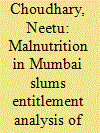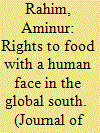| Srl | Item |
| 1 |
ID:
141772


|
|
|
|
|
| Summary/Abstract |
Despite strong constitutional safeguards and promises, malnutrition persists in major Indian conurbations such as Mumbai and manifests as a group phenomenon concentrated in certain slum pockets that remain institutionally isolated. Based on a detailed study of four slums in Mumbai, this article uses the entitlement approach developed by Amartya Sen to examine how group identity affects group differentials in achievement of basic capabilities. Irrespective of similar initial endowments, some groups were found able to achieve upward mobility over time, whereas others remained constantly vulnerable. This may be because the access to various resources and the ability to translate them into functioning assets are mediated in various ways, depending on people’s multiple identities, which sometimes constitute barriers. The article concludes that to alleviate malnutrition, proactive state agency and public transfers are needed to enhance deprived groups’ prospects to build on their basic capabilities to improve their lives.
|
|
|
|
|
|
|
|
|
|
|
|
|
|
|
|
| 2 |
ID:
106371


|
|
|
|
|
| Publication |
2011.
|
| Summary/Abstract |
This article seeks to dispel the popular myth surrounding the food crises which precipitated food riots in the global South in 2008. Arguing from a structural and historical perspective, the article suggests that global hunger is a deep-rooted crisis that is embedded in the social and structural variables associated within the nation-state that places a restraint on the self-regulating capacity of nation-states in the South. Internationalizing the food crisis, however, will do more harm to the south's agricultural transformation and rural development. The article argues for integrated rural development that will increase output growth through an institutional, technological, and marketing strategy.
|
|
|
|
|
|
|
|
|
|
|
|
|
|
|
|
| 3 |
ID:
133704


|
|
|
|
|
| Publication |
2014.
|
| Summary/Abstract |
We design an experiment to explore the impact of earned entitlements on the frequency and intensity of conflicts in a two-stage conflict game where players may attempt to use non-binding side-payments to avoid conflict. In this game, Proposers make offers and Responders decide simultaneously whether to accept the offers and whether to engage in a conflict. A simple theoretical analysis suggests that Proposers should never offer side-payments because Responders should always accept them and then still choose to enter conflict; however, our experiment reveals that some individuals use this non-binding mechanism to avoid conflict. Moreover, when subjects earn their roles (Proposer or Responder), conflicts are 44% more likely to be avoided than when roles are assigned randomly. Earned entitlements impact behavior in three important ways: (1) Proposers who have earned their position persistently make larger offers; (2) larger offers lead to a lower probability of conflict; but (3) Proposers whose offers do not lead to conflict resolution respond spitefully with greater conflict expenditure. Hence, with earned rights, the positive welfare effects of reduced conflict frequency are offset by higher conflict intensity. This result differs from previous experimental evidence from ultimatum games in which earned entitlements tend to encourage agreement and increase welfare; thus, our findings highlight the important consequences of endogenizing the costs of conflict. Our analysis suggests that earned entitlements alter behavior by influencing the beliefs of Proposers about the willingness of Responders to accept a peaceful resolution. As a result, these Proposers make persistent high offers, and when their beliefs are disappointed by a Responder's decision to accept a side-payment and still enter conflict, they retaliate.
|
|
|
|
|
|
|
|
|
|
|
|
|
|
|
|